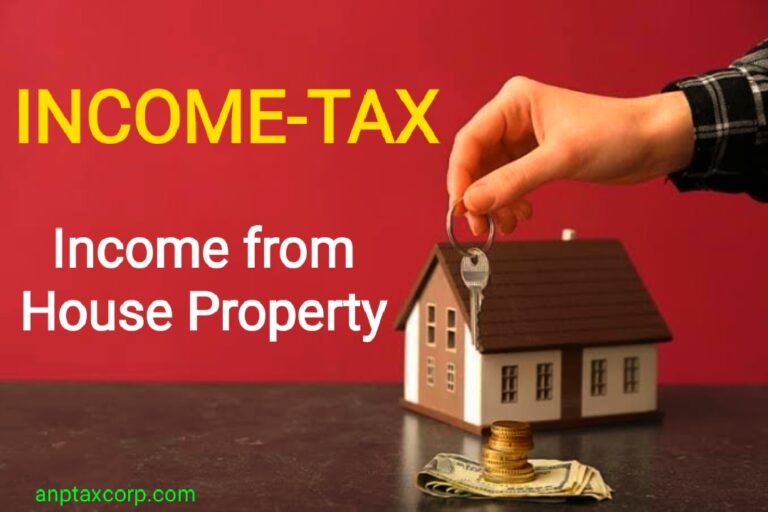Computation of Income from House Property as per I-T Act
Income from House Property: According to Section 22 of the Income Tax Act, the annual value of house property, including any buildings or associated lands owned by the taxpayer, is subject to income tax under the category “Income from house property.” This applies to the entire property, except for the portions utilized for the taxpayer’s business or profession, whose profits are taxable under income tax.
Determination of Annual value of House Property
In the determination of the Annual Value of a House Property, Section 23 of the Income Tax Act outlines specific criteria for assessment. The annual value is considered to be the amount for which the property could reasonably be expected to let annually. If the property is let, the actual rent received by the owner is taken into account, unless the property was vacant during the previous year, impacting the rent received. In such cases, the owner’s receivable amount is considered. Notably, taxes imposed by local authorities on the property are deductible in determining the annual value for the relevant year.
In cases where the property is a house or part thereof and is occupied by the owner for personal residence, or if occupation is not feasible due to employment elsewhere, the annual value is considered nil. Exceptions arise if the house is let during the year or if the owner derives any other benefits from it. If the property comprises more than two houses, the owner can specify two for the aforementioned nil valuation, with the others valued based on the rental approach.
Additionally, for property held as stock-in-trade, where it remains unlet for a specific period after completion, the annual value is deemed nil. This provision applies for up to two years from the end of the financial year in which the construction completion certificate is obtained.
Deductions from Income from House Property
In computing Income from House Property as per Section 22 of the Income Tax Act, certain deductions play a crucial role. Firstly, a deduction of 30% of the annual property value is allowed. Secondly, if the property was acquired, constructed, repaired, or renewed using borrowed capital, the interest payable on such capital is deductible.
For self-occupied or vacant properties due to the owner’s employment elsewhere, the deduction amount (or the aggregate) cannot exceed thirty thousand rupees. However, if the property was acquired or constructed with borrowed capital after April 1, 1999, and completed within five years from the end of the financial year in which the capital was borrowed, the deduction (or aggregate) is capped at two lakh rupees.
In cases of borrowed capital, the interest payable prior to the previous year in which the property was acquired or constructed is deductible in equal instalments for that year and the subsequent four years. It’s important to note that this deduction is subject to the condition that the assessee provides a certificate from the lender specifying the interest amount payable for the property’s acquisition, construction, or conversion of the remaining capital.
Amount not Deductible from Income from House Property
Under Section 25 of the Income Tax Act, it’s important to note that certain interest payments are not eligible for deduction from Income from House Property. Specifically, any interest under this Act payable outside India, excluding interest on a loan issued for public subscription before April 1, 1938, falls into this category.
To elaborate, if the interest payable outside India has not had tax paid or deducted under Chapter XVII-B and there is no designated person in India treated as an agent according to section 163, then such interest cannot be deducted from the Income from House Property.
Treatment of arrears of rent or unrealised rent received
In accordance with Section 25A of the Income Tax Act, it’s important to understand the treatment of arrears of rent or unrealized rent received by an assessee. When an assessee receives arrears of rent from a tenant or realizes previously unrealized rent, it is considered income from house property for the relevant financial year it is received. This applies whether or not the assessee is the owner of the property during that financial year.
In such cases, the amount received is included in the total income of the assessee under the head “Income from house property.” To provide relief, a deduction is allowed, equivalent to 30% of the arrears of rent or the unrealized rent received.
Treatment of House Property owned by Co-owners
As outlined in Section 26 of the Income Tax Act, when a property, comprising buildings or buildings with associated lands, is jointly owned by two or more individuals with clear and identifiable shares, they will not be assessed as an association of persons for tax purposes. Instead, each co-owner’s individual share in the total income derived from that property will be included in their respective total incomes.
Conclusion
Understanding these provisions is crucial for accurate tax reporting and compliance in respect of income from house property. Be aware of the conditions outlined in Section 22 to Section 26 to ensure a comprehensive understanding of the treatment of Income from House Property under the Income Tax Act. Stay informed to make well-informed financial decisions.
To Know About Income Tax Provisions on Income from House Property CLICK HERE
To Access the Tax Savings Tips for FY 2023-24 CLICK HERE
Also read
Way to file your Income Tax Return after Missing the December 31 Deadline
Major Income Tax Deductions for Individuals Available in FY 2023-24 under Old Tax Regime
